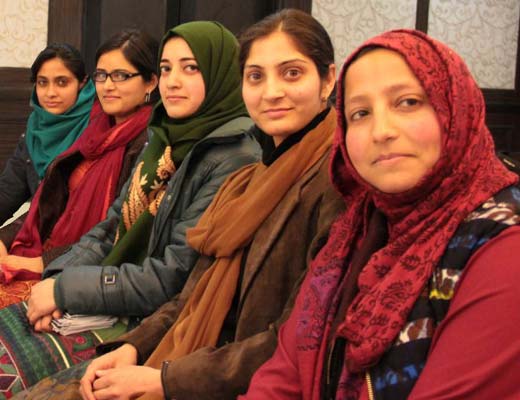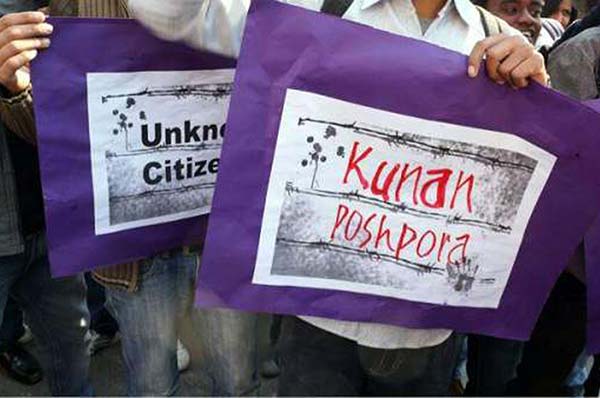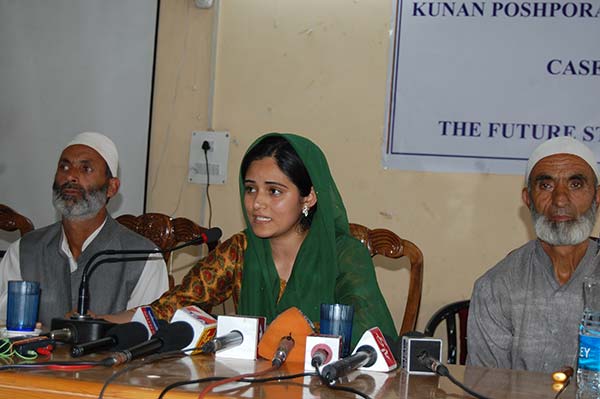They were toddlers when Kunan tragedy became international news in 1991. Two decades later, five girls approached court and reopened the shut and closed case. Mohammad Raafi locates the Kunan petitioners to understand their persona, motivation, apprehensions and the long struggle they put in to manage justice for the victims

On an April morning in 2013, an under-grad Ifrah Butt, was sitting in her kitchen surrounded by passport size portraits of fifty women. Curious, her house-maker mother, asked her: “Who are all these women?”
Then only 21, Ifrah, with a few of her friends, was working to file a fresh petition in the High Court, Srinagar, told her mother that these women are part of a petition. They wanted judicial intervention to reopen /re-investigate infamous Kunan rapes. “Do you remember Kunan?” she asked her mother.
“Yes, I have a faint idea.”
“I am helping to get them justice,” Ifrah told her while readying herself for a lecture about why she has to be at the forefront in such a sensitive matter. Instead, Ifrah’s mother asked her if she could become part of the petition.
“Why not,” replied a visibly excited Ifrah.
When the petition was filed on April 29, 2013, both Ifrah and her mother were part of it along with fifty other Kashmiri girls. Like Ifrah, most of the girls, who were part of the petition, were born years after the Kunan hamlet became an international lead symbolizing ruthlessness of counter-insurgency.
Despite her banker father’s nod Ifrah had to manage time between her studies. “I assured him that I won’t let him down,” recalls Irfah, who went on to complete her graduation and secure a seat to study international relations.
While Ifrah was discussing Kunan with her father, her younger sister, a minor, moved by the conversation asked, “Can I help. I too want to be part of the petition.”
On the intervening night of 23 and 24 February, 1991, the personnel of 4-Rajputana Rifles, cordoned off Kunan, some 7 km from Kupwara, and dragged men outside and held them captive in two houses. Soldiers barged into houses, and raped the womenfolk, regardless of their age. According to the FIR, filed on March 8, 1991 at Trehgham police station, 23 women were raped.
On March 22, 1991, police chose IPS officer Dilbagh Singh, then SP of Kupwara, to investigate the incident who set up Special Investigation Team (SIT) to probe it. Three months later (July 12, 1991), Singh was replaced by S K Mishra who started investigation afresh. Mishra wrote to the then Director (Prosecutions) at the police headquarters for his opinion. On September 23, 1991, Director (Prosecutions) informs Mishra that the case is “un-fit for launching criminal prosecution”.
A month later, the case was closed.
For next thirteen years nothing happened and victims continued to live under the fear of army in a highly militarized belt. Then in 2004, a victim from one of the villages approached J&K Human Rights Commission urging them to reopen the case and launch a fresh investigation. In 2007, other victims knocked at the doors of SHRC, to get justice, taking the number of victims to forty.
For Ifrah, who would spend her spare time volunteering for a local human rights NGO, the trigger to fight for the justice of victims came in 2012. “I remember the kind of anger that spilled over in India against the rape of Nirbhaya,” says Ifrah. “Me and my friends discussed the lack of same kind of response by Indian civil society when it comes to happenings in Kashmir.”
It was disturbing for Ifrah and her friend Samreena Mushtaq, 28, a co-volunteer at the NGO.
Samreena, was brought up by her mother. She was three when her father had died. When Samreena grew up, she began asking her mother cause of her father’s death. But every time her mother would dodge the question. Then one day, while researching Kunan case, Samreena came across a file bearing her father’s picture at an NGO’s office. The file contained details of torture that Samreena’s father was subjected to before he was killed in custody. Samreena’s mother did not remarry, instead supported her two kids with her meagre income.
“It was then we decided to fight for justice on behalf of the victims,” recalls Samreena.
Immediately both Ifrah and Samreena started collecting details about the incident. Within a month, three more girls joined them: Natasha Rather, Munaza Rasheed, and Essar Batool, all in their late twenties. As the word spread around, fifty women, from different walks and professions, joined hands and became part of the petition.

For Munazah, Natasha and Essar, who had studied in convent schools, it was difficult to make their elite friends understand what they are doing. “They would tell us how we are putting our careers at risk by associating ourselves with Kunan,” recalls Munazah. “It was hard to make them understand why we are doing it.”
When the petition seeking reopening of the case was filed, signed by fifty women including Ifrah’s mother and her friends, the court admitted the petition and took it as Public Interest Litigation (PIL).
“It was not easy for us to convince our parents about what we were doing,” recalls Essar Batool, a trained social worker from University of Kashmir.
Unlike Ifrah, Essar and others had tough time convincing their parents. “They told me it was not a good idea to fight against the state in a conflict ridden Kashmir,” recalls Essar.
Such was the fear to stand against the state that Essar’s younger sister warned her that she might be raped too. “I fear you might end up like the victims you are trying to get justice for. You are fighting a strong and organized system. And ruthless too,” she had warned her sister. But Essar stood firm.
“My family was afraid initially, but they never ever since intruded in this matter and gave me complete independence,” Essar says. They are now proud of her work.
As a young girl, Essar remembers, how uncomfortable it was to hear the word “rape” on television. But after she became part of the petition, one evening, after dinner, Essar sat down with her family and detailed them about the tragedy.
“It helped in changing the way rape or sexual violence was talked about in our family,” recalls Essar.
Court Room
The first time Ifrah and her friends stepped inside the courtroom was on April 29, 2013. “It was the first hearing of our petition in the High Court. We were nervous,” recalls Natasha Manzoor, 28, who joined a local NGO after completing her masters in social work from Kashmir University. Two hearings later, the case was transferred to Kupwara court.
Only child of a retired middle-rung government official Natasha, would manage her job and household while working with the victims of Kunan. “I used to finish my work in Baramulla and then rush back to Srinagar to help with research and then go back and get involved with errands, too,” says Natasha. “My parents were extremely supportive of my endeavours, including this one.”
Then there were days when they had to be present for the hearings at Kupwara.
Apart from their lawyer colleague Munaza Rasheed, none of the girls had been inside a courtroom in their life. “Actual courtroom is completely different from what you see on a television,” says Ifrah.
When the case was transferred to Kupwara, the five girls, who represented 50 petitioners, would travel to the frontier region to be part of the proceedings. “After the hearing we used to protest outside the court premises against the army,” says Munaza.
After first few hearings, a number of volunteers – mostly girls –joined them in Kupwara. “These volunteers would travel on their own from Srinagar and other parts of Valley to show their support for what we were doing,” says Ifrah. “It felt great.”
The toughest part of the campaign was managing constant harassment, intimidation, and gesturing by the soldiers present outside the courtroom in Kupwara, says Ifrah. “Their (army’s) lawyer would ask us who are you girls, where are you from, why are you fighting for these women, who is backing you and all these things once the proceeding would end for the day,” recalls Munaza. “But after two or three hearings, we got used to it.”
For Ifrah, struggle is not about the outcome. “We just want to develop a culture of resistance where people must question impunity enjoyed by the security grid, where people will not remain silent in the face of injustice.”

Visiting Kunan
Since 1991, a number of journalists, social activists, lawyers, filmmakers have visited Kunan. “They sell our pain for their own gains,” was first reaction of victims and their families upon seeing an outsider.
“There was a deep sense of betrayal among the victims regarding outsiders,” says Ifrah.
However, Ifrah and her friends, well aware of the distrust, did their homework before visiting the villages. “We went their only after filing the petition and collecting details related to the case,” says Ifrah. “The idea was to show them that we are serious about getting them justice. We wanted to tell them that we feel their pain.” It worked.
Since then the five petitioners visited Kunan more than fifty times.
The Book
After successfully bringing back Kunan in media focus, the core group, decided to take the case to the next level: to compile the pain in the form of a book.
Then began the painful process of data collection and finding those people who have visited the village days after the tragedy. “It was a long and painful process, I must say,” says Ifrah, “But we are glad we did it.”
Authored jointly by the five, the book titled ‘Do You Remember Kunan Poshpora’ was finally completed after two years of hard work. The book already showcased in Jaipur Lit Fest is being launched on February, 23, 2016, exactly 25 years after the incident, is published by Zubaan Publications. It details the struggle that went behind reopening of the case and the long legal struggle faced by the survivors. In the course of 25 years, five of the victims have died.
The book also details the life in Kunan. It talks about how the victims are being stigmatized by the people from surrounding villages, and how their children are living the trauma. “Life is hellish for the survivors. And every time the perpetrators are not the men in uniform. They are amongst us, they are the people who refuse to let these survivors live with dignity,” says Essar.
The book also chronicles the eye-witness accounts of those people who visited the village after the incident. “We talked to journalists, enquiry commission officers, government officials etc to understand the situation then,” says Munaza.
The most difficult question to answer that Munaza faced while writing the chapter on life in the village, was to pendown the magnitude of pain felt by the young victims. “I realized none of us can actually answer this,” says Munaza.
For these young girls, the book is a fight against the idea of forgetfulness. “At the end of the day, is there a choice between choosing that we forget, if we can, correct as we must and make people accountable as is necessary and then learn to move on?” Salman Khursheed, then minster of external affairs, responded to a question on Kunan rape in Srinagar. Ifrah terms it luxury insisting the survivors can not afford it.
















Great Job! May almighty bless you, girls!
One of the best stories in the context of Kunan rapes! Hats off
I humbly appreciate your work , the way you pleaded and drafted all circumstantial facts in your book is outstanding. I hope you people will carry this issue till the justice will be rewarded to the victims.
More important i suggest you people to create a platform for the empowerment, economical and social ehancement of down rotten section of the society espically women including Dowery deaths and honour killings ….